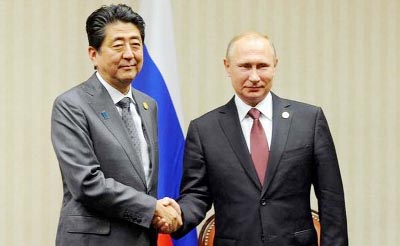
Reuters, Tokyo :
Japan and Russia look set to improve ties and clinch some business deals when their leaders meet next week, but both sides are scaling back expectations of a big breakthrough in a territorial row that has blocked a peace treaty to formally end World War Two.
Prime Minister Shinzo Abe, who pledged in September to “resolve the territorial issue”, wants to leave a diplomatic legacy by breaking the impasse with Russia, a strategy he hopes would help Tokyo counter a rising China. Territorial concessions would be risky for Russian President Vladimir Putin but the business agreements Tokyo is dangling would be welcome for an economy hit by low oil prices and Western sanctions.
But Abe said this week while he hoped for progress, the matter couldn’t be solved in one meeting. Russian officials have echoed the cautionary tone.
“We should not raise expectations. It will be enough if one fresh step toward the resolution of the territorial issue will have been taken,” Muneo Suzuki, a lawmaker long involved in Japan-Russia ties and now advising Abe, told Reuters.
“I think that one step can be taken.”
The territorial feud stems from the Soviet Union’s seizure at the end of World War Two of four islands off Hokkaido, known in Japan as the Northern Territories and in Russia as the Southern Kuriles.
Although ties between the two nations have improved since the end of the Cold War, there has been domestic opposition in both countries to compromising over the ownership of the islands, which remain under Russia’s control. Abe and Putin meet on December 15-16, first in Abe’s constituency in southwest Japan and then in Tokyo the next day.
The two sides are working to revive security talks and joint naval rescue training halted after Russia annexed Crimea in 2014, triggering Western sanctions. They also might agree to speed up talks on joint economic activity on the four islands, Japanese media said.
“These are meagre results after such high expectations,” said James Brown, a professor at Temple University’s Japan campus.
Diplomatic sources cite a variety of reasons for the dialling down of expectations in Tokyo, from the possibility US President-elect Donald Trump will improve Washington’s ties with Moscow and thus make Japan a less attractive partner to suggestions Abe put too much trust in his personal ties with Putin, whom he has met 15 times during his two terms as premier.
Japan long insisted its sovereignty of all four islands be confirmed before a peace treaty is signed.
But there are signs it has been rethinking its stance, reviving a formula called “two-plus-alpha”, based partly on a 1956 joint declaration in which the Soviet Union agreed it would hand over two smaller islands after a peace treaty was signed.
“It would be good if they can say concrete negotiations will be launched based on the 1956 Japan-Soviet joint declaration to achieve a resolution,” Suzuki said.
Japan and Russia look set to improve ties and clinch some business deals when their leaders meet next week, but both sides are scaling back expectations of a big breakthrough in a territorial row that has blocked a peace treaty to formally end World War Two.
Prime Minister Shinzo Abe, who pledged in September to “resolve the territorial issue”, wants to leave a diplomatic legacy by breaking the impasse with Russia, a strategy he hopes would help Tokyo counter a rising China. Territorial concessions would be risky for Russian President Vladimir Putin but the business agreements Tokyo is dangling would be welcome for an economy hit by low oil prices and Western sanctions.
But Abe said this week while he hoped for progress, the matter couldn’t be solved in one meeting. Russian officials have echoed the cautionary tone.
“We should not raise expectations. It will be enough if one fresh step toward the resolution of the territorial issue will have been taken,” Muneo Suzuki, a lawmaker long involved in Japan-Russia ties and now advising Abe, told Reuters.
“I think that one step can be taken.”
The territorial feud stems from the Soviet Union’s seizure at the end of World War Two of four islands off Hokkaido, known in Japan as the Northern Territories and in Russia as the Southern Kuriles.
Although ties between the two nations have improved since the end of the Cold War, there has been domestic opposition in both countries to compromising over the ownership of the islands, which remain under Russia’s control. Abe and Putin meet on December 15-16, first in Abe’s constituency in southwest Japan and then in Tokyo the next day.
The two sides are working to revive security talks and joint naval rescue training halted after Russia annexed Crimea in 2014, triggering Western sanctions. They also might agree to speed up talks on joint economic activity on the four islands, Japanese media said.
“These are meagre results after such high expectations,” said James Brown, a professor at Temple University’s Japan campus.
Diplomatic sources cite a variety of reasons for the dialling down of expectations in Tokyo, from the possibility US President-elect Donald Trump will improve Washington’s ties with Moscow and thus make Japan a less attractive partner to suggestions Abe put too much trust in his personal ties with Putin, whom he has met 15 times during his two terms as premier.
Japan long insisted its sovereignty of all four islands be confirmed before a peace treaty is signed.
But there are signs it has been rethinking its stance, reviving a formula called “two-plus-alpha”, based partly on a 1956 joint declaration in which the Soviet Union agreed it would hand over two smaller islands after a peace treaty was signed.
“It would be good if they can say concrete negotiations will be launched based on the 1956 Japan-Soviet joint declaration to achieve a resolution,” Suzuki said.

